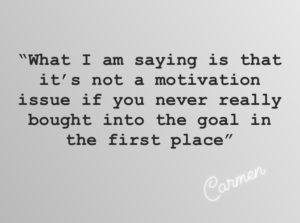 Does motivation precede action or does motivation build after actually doing something? The question is valid, but it’s also false. Why? It’s too simplistic.
Does motivation precede action or does motivation build after actually doing something? The question is valid, but it’s also false. Why? It’s too simplistic.
We all do things each and every day that we don’t want to do, but we do it anyways. On some days, this includes getting out of our pajamas… but when it comes to the things we need to do to get to the bigger goals in our lives, the things that are meaningful to us, people talk a lot about not being able to gather the motivation to do it. Given that a person is in reasonable health, and actually has the ability to do the things they are trying to do then the it generally boils down to one of two issues; 1., they don’t really want it, and 2., they don’t think they can do it.
I talk a lot about the first block, with my clients and in public speaking or blogging content because I see it all the time and it is a really hard message for people to get. A lot of people set goals and ambitions based on what they think they should want, what their parents or partner wants, or what society  has blatantly promoted as their way to happiness. These can be macro goals like going to university, choosing a specific career, or their relationship status. Assumed goals can also be more micro like being organized, thin, or what to look like. These false assumptions even corrupt how we think about introversion, personality, and how quickly we talk (seriously, it’s true). So, people set off on fitness goals, try to be ‘more organized, better students, learn how to find happiness in relationships, and yet never actually manage to take the steps to get there in any consistent way. It’s hard to push yourself to study the needed hours to ace the exam if you don’t really buy into the idea of University. This is one I see all the time. Parents tell me they want support to help their teens be better students and not be lazy, but the kid tells me that they have never wanted to go to University because they want to be an artist or take a less traditional occupational path but they are afraid to tell their parents. I’m not saying that parents shouldn’t encourage their kids to work hard, and I am not against University or nontraditional paths. What I am saying is that it’s not a motivation issue, if you never really bought into the goal in the first place.
has blatantly promoted as their way to happiness. These can be macro goals like going to university, choosing a specific career, or their relationship status. Assumed goals can also be more micro like being organized, thin, or what to look like. These false assumptions even corrupt how we think about introversion, personality, and how quickly we talk (seriously, it’s true). So, people set off on fitness goals, try to be ‘more organized, better students, learn how to find happiness in relationships, and yet never actually manage to take the steps to get there in any consistent way. It’s hard to push yourself to study the needed hours to ace the exam if you don’t really buy into the idea of University. This is one I see all the time. Parents tell me they want support to help their teens be better students and not be lazy, but the kid tells me that they have never wanted to go to University because they want to be an artist or take a less traditional occupational path but they are afraid to tell their parents. I’m not saying that parents shouldn’t encourage their kids to work hard, and I am not against University or nontraditional paths. What I am saying is that it’s not a motivation issue, if you never really bought into the goal in the first place.

The other reason that people do not engage in the goals that they set for themselves? They don’t believe they will be successful. This is a self-confidence and esteem issue, and it is incredibly sad. Maybe it is lack of confidence because they were never given permission to disagree or fail. It may be that being given participation awards and trophies for 18thplace has undermined their ability to tolerate failure and disconnected perseverance and hard work from their success equation. Other times lack of self-belief is a result of very difficult pieces of a person’s origin story including; trauma, enduring hardship, health issues, mental health diagnosis, physical and mental health challenges, or learning / neurological differences. I have a very real and deep compassion for anyone who is struggling to engage in their life with their own goals because of esteem. Building yourself up so that you can get out of your own way is very, very difficult, but it is possible. I wish everyone in this camp could access excellent mental health support.
It you have goals that you know you want to achieve, truly (take a long and sober look at this), AND you have the confidence to accept failure on the way, but you are still not engaged? Then you have to wrap your head around the following idea; motivation often follows action. Let me back up, FIRST, you don’t have to want to do something to do it, THEN, motivation follows action. I don’t have to want to get to work early in the morning so that I am better positioned for the promotion, I just have to do it. After a few weeks of doing it I will probably get a comment here or there ‘nice job’ or ‘noticed your dedication’, which will provide positive reward and a little surge of dopamine in my brain to help seal the deal. Then, I will be more likely to continue getting to work because I am seeing small gains and getting used to the routine and then before you know it I actually want to be there early.

I should make a quick point also that this is where passion comes in. You’ll notice that I said most of us do things every day that we don’t necessarily want to do. Well, I have built my life around doing as little of that as possible. I did this by pursuing things that I am absolutely passionate about. I don’t have to convince myself to go to the clinic, take an extra call, or work on content for The Practice Calgary because I am passionate about it. I thrive on clinical work, see a vision for The Practice, and find the entrepreneurial challenge enticing. We’ve grown from sole practitioner to a team of seven in as many years and just had our largest client service month to date. I love this and so motivation is never a challenge here. Discouragement, only temporarily. Exhaustion, sure on days. But never, ever a motivation issue because I am passionate about it.
Figure out if what you think you want is what you want, identify your blocks to believing in yourself, and find your passion. Motivation or action first depends entirely on the context.
Best,
Carmen Dodsworth, R. Psyc
Founder & Clinical Director, The Practice Calgary
www.thepracticecalgary.com
403.472.5862
